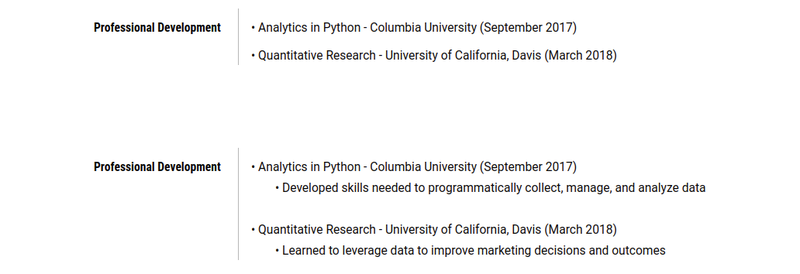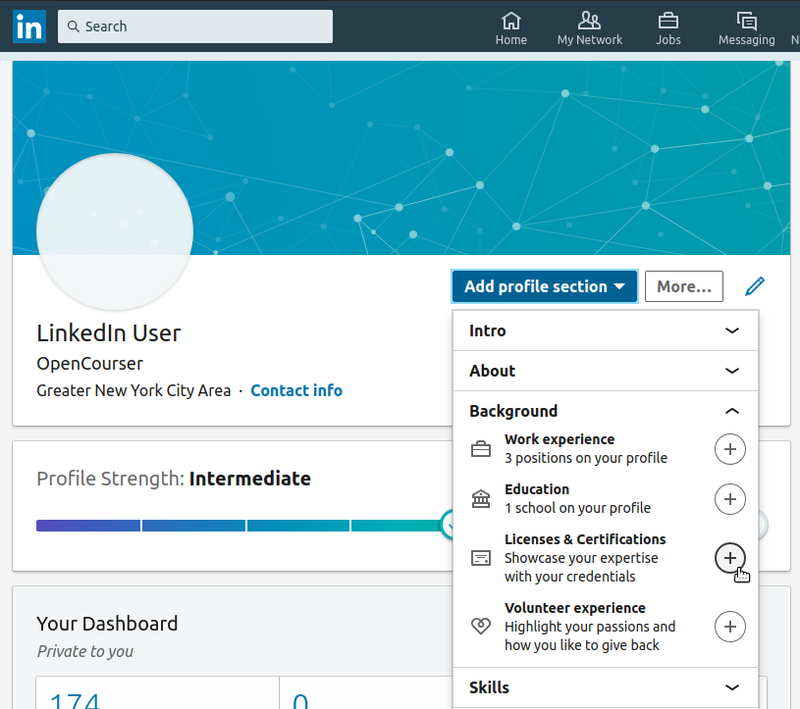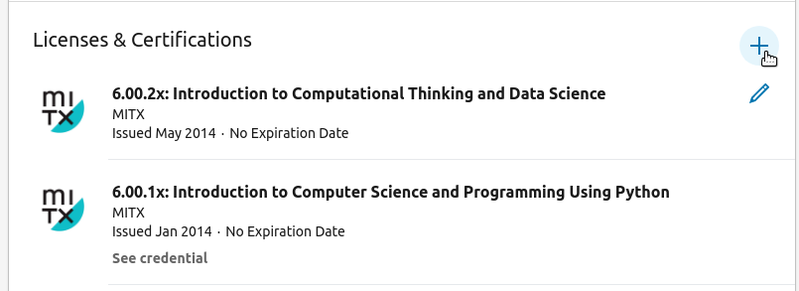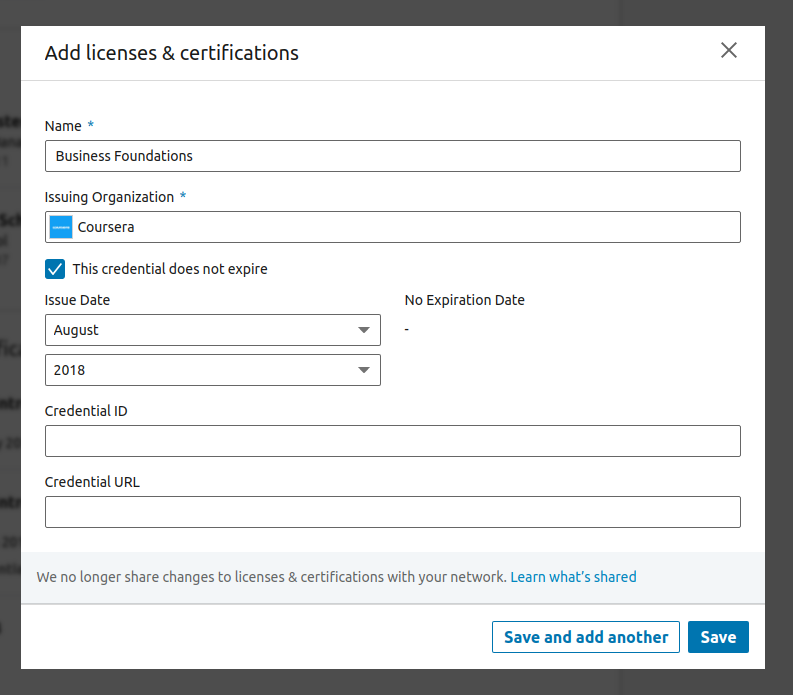

Updated February 2020 to reflect new changes made to LinkedIn
Behold, the online course certificate. On the surface, it proves that you've passed a course. Below it, it suggests that you've learned something new and you're a better candidate as a result.
Prospective employers will want to know about your course achievements. By adding them to your resume/CV and LinkedIn profile, you can share your certificates with them.
Note that not all certificates are the same. Some can bolster your credentials while others can detract from your resume. We'll look at which ones you should include and how best to add them to your resume.
The big picture
Imagine that you’re a hiring manager. Each week, you sift through hundreds of resumes. What does a resume become to you?
A quick 15-second glance into someone’s professional life—maybe something to reference during an interview if it gets that far.
Knowing this, you’ll want to temper your expectations.
For all that your certificates are worth, your hiring manager will likely miss them on a first skim. Instead, she’ll focus on other parts of your resume, like the one about your past work experience. She'll also be scanning for keywords and metrics that help her decide whether to move you forward.
That doesn't give you an excuse to put less thought into adding your certificates. They can still play a pivotal role.
Relevant certificates can make your resume easier to find. This is especially so for employers who use software to surface relevant resumes to the top. The more a resume matches its target job description, the higher the software will rank it. If your certificates contain matching keywords, then you'll want to keep it on your resume.
Certificates may also come up in later interviews. Pitched the right way, your online courses can cast you in a positive light with interviewers. They might even contribute to a hiring decision that leads to an offer.
Of course, none of this can happen if your certificates aren't relevant. For each resume you send, ensure that a course you list will bolster your qualifications. A hiring manager who notices your certificate should react well to it. For it to be effective, a certificate should make clear and immediate sense why it belongs on your resume.
Setting up your certificates in your resume
Your certificates should occupy a small section near the end of your resume.
As for the layout, we favor a modified variation of a format suggested by edX. It's clear, concise, and conveys the right level of detail.
First, create a section titled “Professional Development” or “Professional Training.” Under this header, you'll create some bullets. How many will depend on whether you choose a condensed or expanded layout.
The condensed layout calls for one bullet per certificate. In that bullet, you'll record the name of the certificate. You'll also note the name of the school or university issuing it and the month you received it. Usually, this is enough detail for most hiring managers.
If you need to add more details then you should use the expanded format. It follows the condensed layout, but adds a sub-bullet beneath each certificate. The extra real estate gives you room to describe relevant qualifications you learned. It's particularly useful if your certificate's name is ambiguous or seems irrelevant.
 Like your resume, your LinkedIn profile can also house your certificates. The key difference is your audience—hiring managers vs. recruiters and other professionals. That means you'll want to add certificates that appeal to your field—not a specific employer.
Like your resume, your LinkedIn profile can also house your certificates. The key difference is your audience—hiring managers vs. recruiters and other professionals. That means you'll want to add certificates that appeal to your field—not a specific employer.
Adding certificates to your LinkedIn profile
We've written in-depth guides for certificates issued by Coursera and Udemy, which provide more specific instructions for locating your certificate. Feel free to use those guides or continue below for our general guide.
1. Near the top of your profile, click the Add Profile Section button. Then select Background and click the “+” icon next to Licenses and Certificates.

2. Scroll down to the Licenses & Certifications section. Click on the “+” icon to add a new certificate.
 3. A box will pop up allowing you to enter your certificate details. Enter the name of the certification name (typically, the course name).
3. A box will pop up allowing you to enter your certificate details. Enter the name of the certification name (typically, the course name).
4. For Issuing Organization, begin typing the name of your certificate's issuer.

4. If you have your certificate number, drop it into the Credential ID box
5. You may also copy and paste the link to your certificate by pasting it to the Credential URL field
6. Hit "Save" when you’re done or "Save and add another" if you have more certificates to add.
Quality over quantity, less is more
A hiring manager can infer a lot about you from a certificate. She might see you as self-motivated, driven to overcome challenges. She might see you as someone with the initiative to recognize—and fill—knowledge and skills gaps.
Any one of these traits can make you a desirable candidate.
Intuition might tell you then to add as many certificates as you can. Unfortunately, too many certificates can quickly detract from your resume.
Say you have the perfect resume, but you've listed too many certificates. A forgiving hiring manager or recruiter will overlook this as a minor oversight. But expect most to reach less flattering conclusions about how you:
Value your audience's time
Each course takes a few seconds to decipher. First, your hiring manger needs to figure out what a certificate means. Then she'll need to decide whether it makes you a more qualified candidate.
That might not seem like much time, even if you had five or six courses.
But remember, most hiring managers have a tall stack of resumes to go through. Every second counts. Don't risk losing goodwill with your reader by burdening them with a long list of courses.
Value your own time
Earning a certificate can eat up tens of hours. If you have too many or ones that seem irrelevant, then it might seem like you have trouble managing your time. Worse, you might even appear unfocused.
That might not be the case. You might just enjoy learning for learning's sake. However, don't expect a hiring manager to arrive at that conclusion. Also see the next two bullets.
Understand context
Your resume might be the very first "deliverable" a prospective employer sees from you. Like any good product, it's tailor made for its consumer. It should present the right information at the right place at the right level of detail. Above all else, it should help your readers make a hiring decision.
There's a time and place for everything. Demonstrate that you know this by keeping your course list short.
Surface what's important
A lot of the hard work in any job is separating the proverbial chaff from the wheat. Neglecting to do so for your certificates on your resume shows you're not up for the task on the job.
Remember, a hiring manager has to make rapid fire decisions about resumes everyday. That means making snap judgments that let them weed out weak candidates.
Your course certificates can imply a lot of good things about you. But if you're not careful, they can also leave a negative impression on prospective employers.
As you decide which certificates to list, stick with two rules. 1) keep your certificates relevant and 2) keep your list of certificates short.
Choosing which certificates to share: a balancing act
Not all certificates will make the same impression on prospective employers. Generally, you can see if yours does by asking yourself if it:
- Shows that you have qualifications desired of a role
- Substitutes formal or in-classroom training
- Reflects positively on your professional development
Beyond this simple checklist, you'll want to observe some nuances. We can't cover them all in this post, but we have a few examples to give you an idea of what to look for.
The first relates to how hiring managers perceive certificates intro-level courses. If you're starting your career, they’re likely appropriate. If you're vying for a more senior role though, adding one could set you back. It may make you appear less experienced or qualified. This might be true even if the "intro" course covers an advanced topic.
Another requires more intimate knowledge about your industry. Some fields, for example, may only take formal training into consideration, devaluing your certificates. Other fields might look at online courses as equal to their in-classroom counterparts. When in doubt, seek feedback from peers from your target industry or role.
Other ways to incorporate your online course certificates
Adding your certificate onto your resume isn't the only way to convey its value. Hiring managers care about what you know and what you can do. If you have a valuable skill, chances are no one's going to press you about where you learned it.
If you're on the fence about adding a certificate, consider "deconstructing" it.
Online courses can break down into a set of skills. If you already have a section devoted to "skills" or "additional skills," then this method is easy. Figure out which skills are most relevant and drop them into your resume in place of a certificate.
You can also use the "past experience" section of your resume. This is less common because it assumes a few things. First, you'll need to have put something you learned to use on the job. Second, that experience should have led to a positive outcome.
Writing a strong bullet here can make a strong impression. To a hiring manager, the knowledge you gained from a course is now practical and applicable. Presumably, you'll also have added strong keywords to your resume.
If in the end, you still can't find a good place for your certificates, consider the cover letter. Having one adds a personal touch to your application. You would also be able to explain the value of your certificate in a way you couldn't on a resume.
Up next: the interview
Online courses don't come up often in interviews. When they do, you'll have a unique opportunity to show what your courses have done for you.
In our next post, we'll look at how online courses fit into an interview. We'll also share some potential questions and responses to help you prepare for your discussion.



